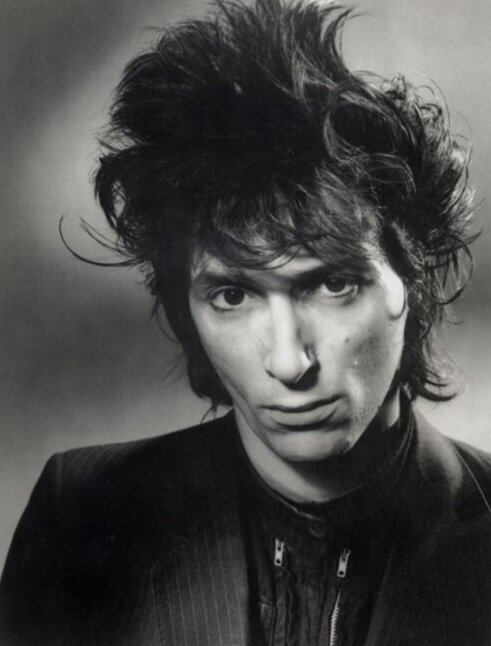You can’t put your arms around a memory (of your absent father)

Johnny Thunders, guitarist with the hugely influential New York Dolls and The Heartbreakers, is a rock & roll icon. His is a story of incredible talent tragically squandered to heroin addiction. This article speculates that the cause of this tragedy was dad deprivation.
His story is depressingly familiar, echoed in the lives of contemporaries of the music scene in the late 70s, such as Sid Vicious and Steve Jones of the Sex Pistols. Like Vicious and Jones, Thunders (real name John Anthony Genzale) had a dad-shaped hole in his life. Shortly after he was born into an Italian-American household in Queens, New York, Thunders’ womanising father left home, leaving him to be raised by his mother and older sister.
His sister’s record collection – mainly girl groups like the Shangri-Las – helped fill the void for a time, and we might speculate on how this influenced the cross-dressing of The New York Dolls. But Thunders was also a natural athlete and excelled at baseball. He even got a tryout with the Little League’s Philadelphia Phillies, but he wasn’t allowed to take part because of the requirement of the presence of a father.
“He transferred his energy into guitar playing and fashion. These activities however didn’t fill the void in his life, as suggested by his addiction to drugs.”
But clearly Thunders had spirit and he transferred his energy into guitar playing and fashion. These activities however didn’t fill the void in his life, as suggested by his addiction to drugs. He and The Dolls became notoriously unreliable due to the influence of drugs and addiction, and his music career was crippled because of the music industry’s lack of willingness to take a risk investing their money there.
Drug-taking wrecked his mental health too. Thunders was sometimes described as appearing depressed. One story tells of him fleeing a hotel room, terrified because he thought Darth Vader was hiding behind his curtains. Psychologists of a psychoanalytic nature might read something into the fact that the Darth Vader character was originally conceived as a ‘Dark Father’, which is perhaps what Thunders’ father became to him, due to prolonged absence.
Like his father, Thunders was popular with women. He tried to settle down and had three sons with wife Julie Jordan in the late 70s, but his drug use made his life shambolic and incompatible with family life. In the early 1980s Jordan took the children from him, and he never saw them again. His eldest son Vito would later be jailed for drug trafficking. Perhaps Vito was also a victim of dad-deprivation.
“In the absence of healthy rites-of-passage overseen by the adult men of the village, young men without dads will create unhealthy rites-of-passage.”
There is a rumor that is interesting in regards to Thunders and Sid Vicious, both of whom were victims of dad-deprivation. It is claimed that Thunders introduced Sid Vicious to heroin, waving a syringe in his face and shouting: “Are you a boy or a man?” Perhaps this shows that in the absence of healthy rites-of-passage overseen by the adult men of the village, young men without dads will create unhealthy rites-of-passage.
Thunders’ drug abuse made him hard work for anyone around him and contributed to his notoriety, but it would be naïve to think that it contributed to his talent. In fact his drug use vastly reduced his creativity and output, and who knows how many more great songs he would have recorded had he not been so hopelessly addicted and self-destructive.
According to Thunders’ biographer, Nina Antonia: “The thing that was always missing was a father figure”. He could have been a massive success, but he became best known for failure. One of his best known songs is “Born to lose” – clearly that’s how he felt, and that’s how he lived. He died tragically aged 39 in New Orleans in seedy and mysterious – possibly murderous – circumstances. Definitely not the way any father wants their son’s life to end, and something for all fathers to learn from.
Further reading
Antonia, N. (2000). Johnny Thunders: In Cold Blood. Cherry Red Books.
Barry J (2017). How much empathy do we have for a Lonely Boy? https://malepsychology.org.uk/2017/01/09/how-much-empathy-do-we-have-for-a-lonely-boy/
Barry J (2019). Born to lose: the sad start and tragic end of Sid Vicious
Farrel, W (2018). The Boy Crisis: Why Our Boys Are Struggling and What We Can Do About It.
Jones, S. (2016). Lonely Boy: tales from a Sex Pistol. London: William Heinemann. ISBN-10: 1785150677
This article was first published on the Male Psychology Network website in 2019
Scroll down to join the discussion
Dr John Barry is a Psychologist, researcher, clinical hypnotherapist & co-founder of the Male Psychology Network, BPS Male Psychology Section, and The Centre for Male Psychology. Also co-editor of the Palgrave Handbook of Male Psychology & Mental Health, and co-author of the new book Perspectives in Male Psychology: An Introduction (Wiley).
Disclaimer: This article is for information purposes only and is not a substitute for therapy, legal advice, or other professional opinion. Never disregard such advice because of this article or anything else you have read from the Centre for Male Psychology. The views expressed here do not necessarily reflect those of, or are endorsed by, The Centre for Male Psychology, and we cannot be held responsible for these views. Read our full disclaimer here.
Like our articles?
Click here to subscribe to our FREE newsletter and be first
to hear about news, events, and publications.

Have you got something to say?
Check out our submissions page to find out how to write for us.
.













































